
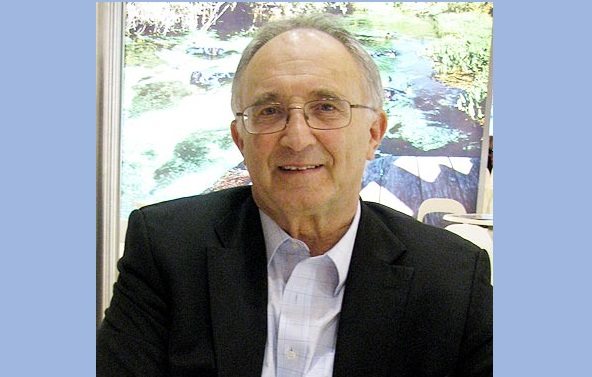
ICTP President Lipman: Take a new look at the silos of the Travel & Tourism Sector
Quoting Benjamin Franklin, at the ITB 2030 SDG Countdown Forum, Professor Geoffrey Lipman, President of the International Coalition of Tourism Partners, called for a new look at the Silos in the Travel & Tourism Sector. He congratulated ECOTRANS and its Members for 25 years of committed focus on sustainability and pledged the support of ICTP, to a closer collaboration, around the SDG’s.
Lipman also commented in his capacity as co-founder of SUNx (Strong Universal Network) – a Climate Resilience program for the sector, noting that “Unless we fix the Climate Change SDG (13) it will fix us” and lambasting the Trump Administration’s “isolated and incomprehensible retreat from for the universally agreed Paris Climate Accord”.
He concluded by reflecting on the vision of his mentor Maurice Strong, who inspired the world to embrace sustainable development over half a century, arguing that we need to focus on the eXistential nature of Climate Change. Lipman urged the broader Travel and Tourism community to bake the Paris Climate targets into every initiative “to stop our grandkids from freezing or frying”
The 2015 Paris Accords and SDGs launched, a 3-decade, low carbon transformation, recognising “Climate Change is existential”. This is the rationale for SUN x– the Strong Universal Network. Under the initial guidance of our friend and mentor, the late Maurice Strong – sustainable development pioneer, we are creating an eXchange for learning, innovation and resilience through Impact-Travel ~ measured: green: 2050 proof. With a growing cadre of graduate climate champions, supported by Maurice Strong Legacy Scholarships.
Geoffrey Lipman & Felix Dodds Co-founders.
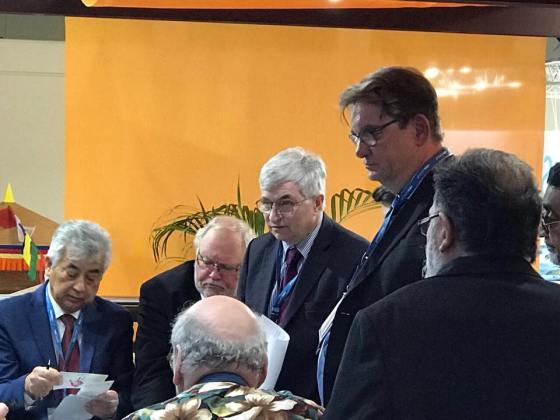
Formed at ITB: Special interest group on Child Protection Through Tourism
Many tourism stakeholders, both from the private or public sector were disappointed when the new secretary-general of the United Nations World Tourism Organization (UNWTO), Zurab Pololikashvili, canceled the annual meeting at ITB of the World Tourism Network on Child Protection. The group had met since 1995 at every ITB.
This disappointment, however, turned into a good day on Friday when it comes to child protection after all. Not only did SKAL International sign THE CODE, but the first meeting of a special interest group on child protection met at ITB Berlin today. This special interest group for child protection was formed under the umbrella of the International Coalition of Tourism Partners (ICTP).
Juergen Steinmetz, chairman of ICTP and publisher of the eTN Group of publications, is a long-time member of this group and responded to UNWTO’s cancellation in forming a special interest group on child protection. This group and those interested in child protection today met in Berlin at ITB. The event was hosted by Deepak R. Joshi, CEO of the Nepal Tourism Board, at their stand.



 Steinmetz said: “I am very pleased to see such a great response to our call for a meeting here at ITB. I would like to thank our friends at the Nepal Tourism Board for their support in hosting our meeting today and hope this will be only one of many more.
Steinmetz said: “I am very pleased to see such a great response to our call for a meeting here at ITB. I would like to thank our friends at the Nepal Tourism Board for their support in hosting our meeting today and hope this will be only one of many more.
“We will provide our own stand at the Arabian Travel Market in Dubai and IMEX in Frankfurt for the Special Interest Group on Child Protection to meet.
“I hope the new UNWTO leadership will cooperate with our effort on this important initiative. I am pleased to hear child protection will be on the agenda set by the UNWTO Secretary-General for the upcoming executive council meeting of the Americas.
“Finally, I am encouraging anyone wanting to add to our initiative or send us statements, best practices, and news on child protection to do so. It’s important for the world to stay informed and allow good initiatives to be repeated.”
Joanna Rubinstein from Childhood USA related: “There is a great momentum after the Solutions Summit to End Violence Against Children in Stockholm last month. Around 60 governments participated in the meeting that was hosted by the Swedish government and the Prime Minister and HM Queen Silvia, the founder of Childhood. Also the DSG of the UN, Amina Mohammed, joined the meeting together with the new heads of UNICEF and WHO.
“The private sector engagement in ending all forms of violence against children is crucial for the achievement of the SDGs. Therefore, using the opportunity of the ITB to meet and discussing child protection in travel and tourism is a good way to complement the other international and local efforts and to advocate for action.”
ICTP had invited UNWTO Secretary-General Zurab Pololikashvil or a representative of UNWTO to attend this meeting, but no response was received.
By becoming a member of The Code, SKAL joined industry leaders when it comes to responsible tourism. The Code (short for “The Code of Conduct for the Protection of Children from Sexual Exploitation in Travel and Tourism”) is a multi-stakeholder initiative with the mission to provide awareness, tools, and support to the tourism industry to prevent the sexual exploitation of children.




The commercial sexual exploitation of children involves the buying and selling of children under 18 years of age for sexual purposes. Sexual exploitation of children in tourism, child sex trafficking, the prostitution of children, and child pornography are all forms of this crime.
Commercial sexual exploitation of children in travel and tourism often takes place in hotels and uses other travel infrastructure. That’s why The Code believes that working with responsible tourism companies is a powerful way to keep children safe and prevent these crimes.

Celebration and Action on International Women’s Day
CALL YOUR SENATORS
On Thursday, March 8 (International Women’s Day), we need a barrage of positive calls to Senate members. Please call 202-225-3121 and you will be transferred to your Senator’s office.
Sample script for call: “My name is ___ and I live in _____ (State). I am calling to thank Senator ______ for supporting the FOSTA-SESTA package and I am calling to confirm that she/he will vote YES so that survivors and states finally will have the legal tools to hold websites accountable for knowingly facilitating human trafficking. Thank you.”
RAISE AWARENESS ON SOCIAL MEDIA — SAMPLE TWEETS AND POSTS
- As International Women’s Day approaches, let’s help @senrobportman @SenBlumenthal bring #FOSTA #SESTA, which will provide a pathway for justice for thousands of women, to the @USSenate for a vote: https://www.portman.senate.gov/public/index.cfm?p=press-releases&id=4F1678C3-3EF2-4E19-95E4-D075060BDE6D #MyFreedomDay #IWD2018 #IamJaneDoe #ListenToSurvivors
- Cheering @senrobportman @SenBlumenthal @clairecmc @SenJohnMcCain @SenatorHeitkamp @JohnCornyn & 66 co-sponsors moving #FOSTA #SESTA to Senate Floor @SenateMajLdr @chuckschumer which will benefit thousands of women. #IWD2018 #PressforProgress #IamJaneDoe #ListenToSurvivors
- Thanks @senrobportman @SenBlumenthal @clairecmc @SenJohnMcCain @SenatorHeitkamp and 66 co-sponsors moving #FOSTA #SESTA to Senate Floor @SenateMajLdr @chuckschumer which will benefit thousands of women. #IWD2018 #PressforProgress #IamJaneDoe #ListenToSurvivors #MyFreedomDay
- Please call your Senator today at 202-225-3121 to vote YES on #FOSTA #SESTA: https://vimeo.com/249095210 #ListenToSurvivors #IamJaneDoe #MyFreedomDay #IWD2018
- @SenateMajLdr @chuckschumer please bring #FOSTA #SESTA to Senate floor for a vote. It will allow thousands of victims and survivors to hold websites facilitating sex trafficking accountable. #ListenToSurvivors #IamJaneDoe #MyFreedomDay #IWD2018 https://vimeo.com/249095210
Follow and tag ECPAT-USA
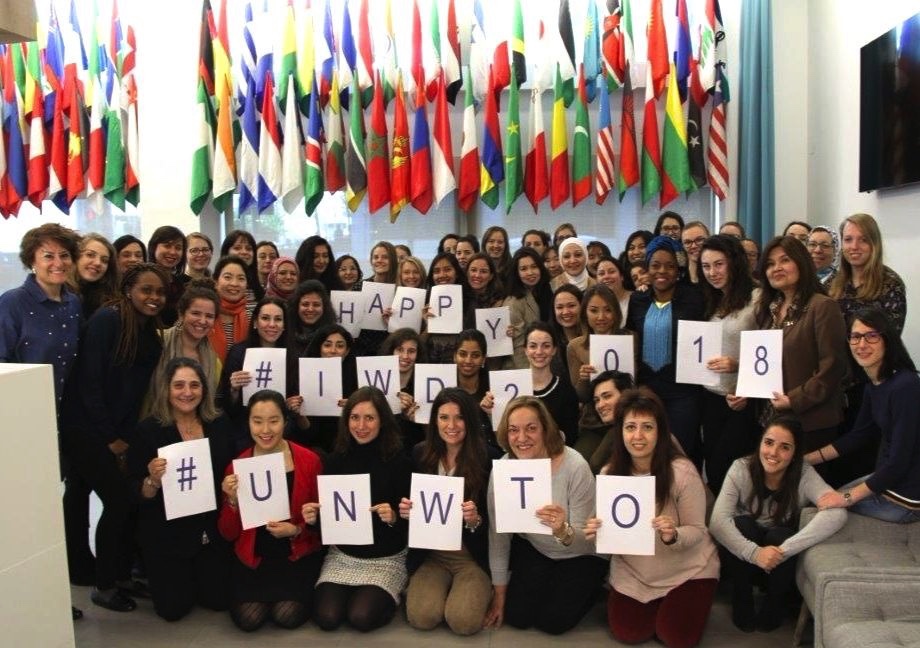
Message by UNWTO Secretary General on the occasion of International Women´s Day
Time is Now: Rural and Urban Activists Transforming Women’s Lives
Tourism can be a leading promulgator of gender equality as it offers a wide range of jobs for women, particularly in developing regions and rural areas where women still face major hardships. Indeed, there are many destinations around the world that rely upon the commitment and motivation of women working at all levels of the tourism supply chain. Yet the reality is that today women still often suffer from stereotyping and discrimination within the global tourism workforce.
As we observe this year’s International Women’s Day, it is time for the tourism sector to strengthen legal protection for women, ensure women’s equal pay and access to entrepreneurship resources, and promote women’s leadership in the tourism sector and participation in formal education.
As one of the sectors with the highest share of women both employed and as entrepreneurs, if gender equality is integrated into tourism planning and business development, we all gain. Greater gender equality impacts positively on the profitability, sustainability and overall competitiveness of the tourism sector.
Tourism can promote women’s empowerment through formal employment, which also impacts at the household and community level – contributing to the 17 universal Sustainable Development Goals, particularly Goal 5, ‘Achieve gender equality and empower all women and girls’, and other SDGs calling for inclusion and equal rights for all (Goals 1, 8, 10 and 11).
This International Women’s Day, I call upon the global tourism community to maximize every opportunity to raise awareness of gender inequality in tourism, and to help mainstream gender issues in tourism policies and strategies.
If we all work together we can realize the equal and inclusive future that we want and help to solve the world’s greatest human rights challenge: achieving true gender equality, social and economic parity between the sexes, and empowering the women that bring success not just to travel and tourism, but to world development as a whole.
Zurab Pololikashvili
Secretary-General, World Tourism Organization (UNWTO)

WTTC President & CEO talks about women leaders in tourism on International Women Day
Women in tourism is a hot subject in the travel and tourism world.
WTTC President & CEO, Gloria Guevara has been a leader in the travel industry for years – first as a female minister of tourism and now chief of the World Travel and Tourism Council. WTTC is often seen as the leading force for the private tourism world, with 100 of the largest global travel companies as members.
The following is the interview with Gloria Guevara for the International Women Day.
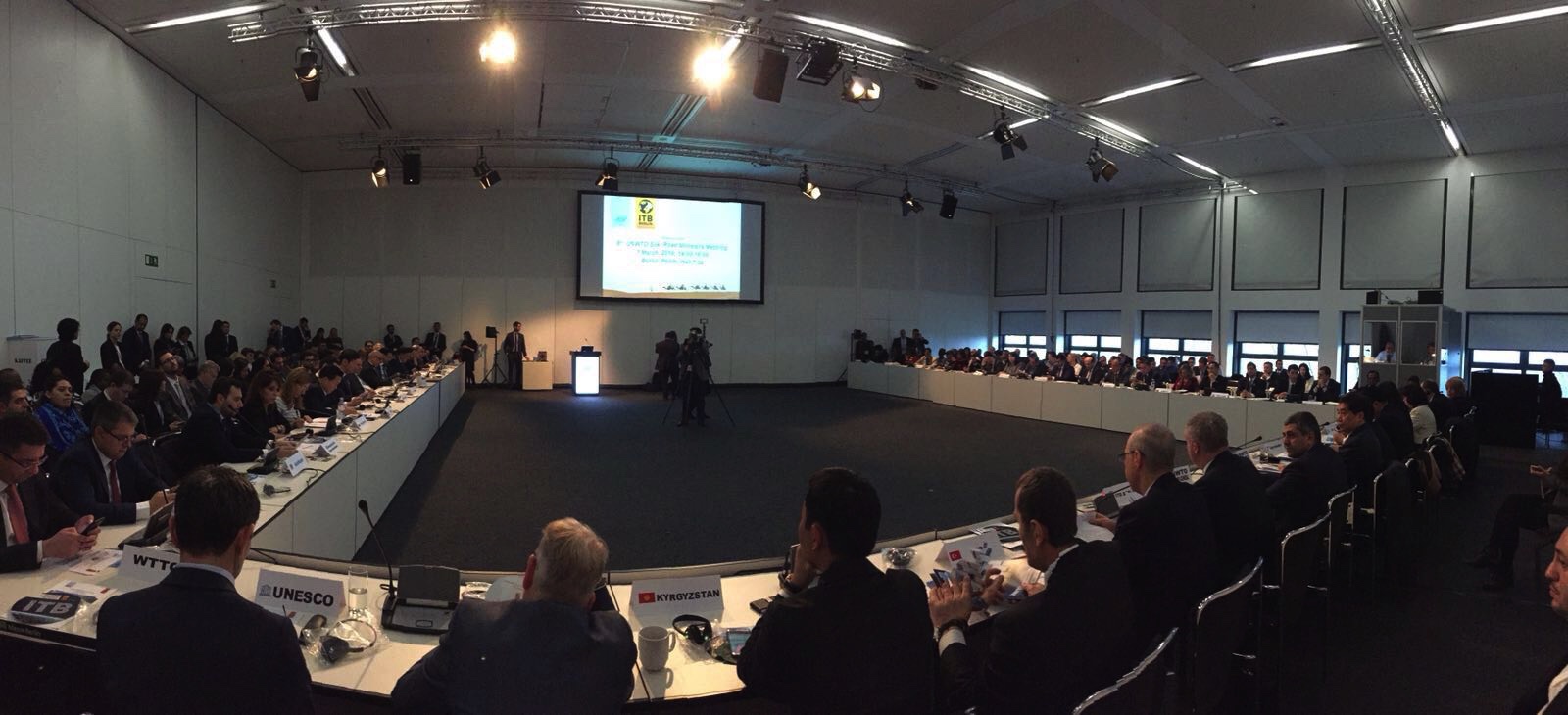
Silk Road: The Most Important Transnational Tourism Route of the 21st Century
The 8th UNWTO Silk Road Ministers’ Meeting held during the ITB Berlin Travel Trade Show, focused on the long-term tourism vision for the historic Silk Road routes and how to establish the Silk Road as the most important transnational tourism route of the 21st century.
With the theme “2025 Silk Road Tourism Agenda”; the Ministers and Heads of the National Tourism Administrations shared their main ideas and strategies, which bring together 34 countries, Malaysia having become the latest member to join this initiative spearheaded by the World Tourism Organization (UNWTO).
“Our joint work on placing the Silk Road as an internationally renowned and seamless cultural tourism route is proving to be very positive. In countries all along the Silk Road, there is growing awareness of tourism’s contribution to cultural preservation, regional cohesion, and intercultural understanding”, said UNWTO Secretary-General Zurab Pollikashvili, during the meeting. “Cross-country tourism projects are growing, and the interest of trade and consumers in the Silk Road continues to rise”, he added.
Primarily associated with inland routes, the historic Silk Road also comprised an extensive network of maritime itineraries linking various cultures. Against this backdrop, UNWTO has assessed the tourism potential of Maritime Silk Road thematic routes across Asia and took the occasion of this year’s meeting to present the research study “Tourism Impact of the 21st century Maritime Silk Road”, jointly developed with Sunny International.
UNWTO’s work around the Silk Road aims to maximize the benefits of tourism development for local Silk Road communities, while stimulating investment and promoting the conservation of the route’s natural and cultural heritage.
While Silk Road destinations stand to benefit from the persistent strong growth of international tourism, putting sustainability and trans-border cooperation first will be key to fully develop its benefits. The conclusions of the Silk Road Ministers Meeting will be further specified during the 8th UNWTO Silk Road Task Force Meeting in Turkey in April, and during the 8th UNWTO International Meeting on Silk Road Tourism in Greece in October 2018.
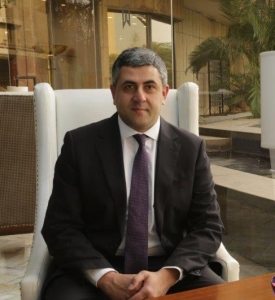
Opening Ceremony of ITB Berlin 2018:UNWTO Secretary General speaks
UNWTO Secretary General Zurab Pololikashvili last night spoke at the opening of the ITB in Berlin.
This is a transcript of his speech:
German chancellor Merkel,
Governing Mayor Müller,
Dr. Frenzel,
Dr. Goeke,
Distinguished guests,
Ladies and gentlemen,
Guten Abend.
It is an honour to be with you today.
I wish to thank ITB for its continuous contribution to the development of the tourism sector.
Ladies and gentlemen,
We gather at a time when a record number of tourists are travelling around the world.
International tourist arrivals grew by 7% in 2017, to reach 1.3 billion. This is an all-time record.
Today, 10% of the world’s GDP, 10% of the world’s jobs, and 7% of the world’s total exports come from tourism.
These are naturally very good news for our economies and our societies.
Yet, besides consolidating the growth of our sector, we need to grow better.
We need to turn these big figures into benefits to all people and all communities, leaving no one behind.
We need to decouple growth from resource use. Place Climate Change at the heart of our agenda.
We need to use the power of technology to make tourism smarter, more competitive and more responsible.
We need to make tourism a leading sector in the road to 2030 and the achievement of our common goals – the 17 Sustainable Development Goals.
Ladies and gentlemen,
I took office only two months ago.
It is with a sense of pride and humility that I assume my post as Secretary-General of the United Nations World Tourism Organization for the period 2018-2021.
Tourism’s sustained growth brings immense opportunities for economic welfare and development.
Yet, it also brings in many challenges.
Adapting our sector to the challenges of safety and security, to constant market changes, to digitalization and the limits of our natural resources should be priorities in our common action.
In this vein, I propose that we as a sector stand together to address the following priorities:
1. Education and Job creation
2. Innovation and technology
3. Safety and Security; and
4. Sustainability and Climate Change
To do so we need to:
1. Embrace a digital tourism sector
2. Adapt to new business models
3. Better manage tourism growth
Someone said there is no “overtourism, only under management”
4. Invest in education and skills development
Dear Friends
Ladies and gentlemen,
If we are to address these issues we have to strengthen public/private cooperation as well as public/public coordination.
I wish to promote what I would call a tourism alliance:
• between ministries,
• local administrations,
• private sector,
• technology partners,
• and so many others on the wide-reaching tourism value chain.
UNWTO is ready to support and work with you to make this happen.
Together we can translate tourism growth into more investment, more jobs and better livelihoods.
Together we can make tourism a sector that protects our environment, our cultures and our people.
As Chancellor Merkel said addressing the tourism industry leaders last year, “you are all development helpers”.
We count on your support and partnership and look forward to working together for a more competitive and responsible tourism sector.
Thank you.
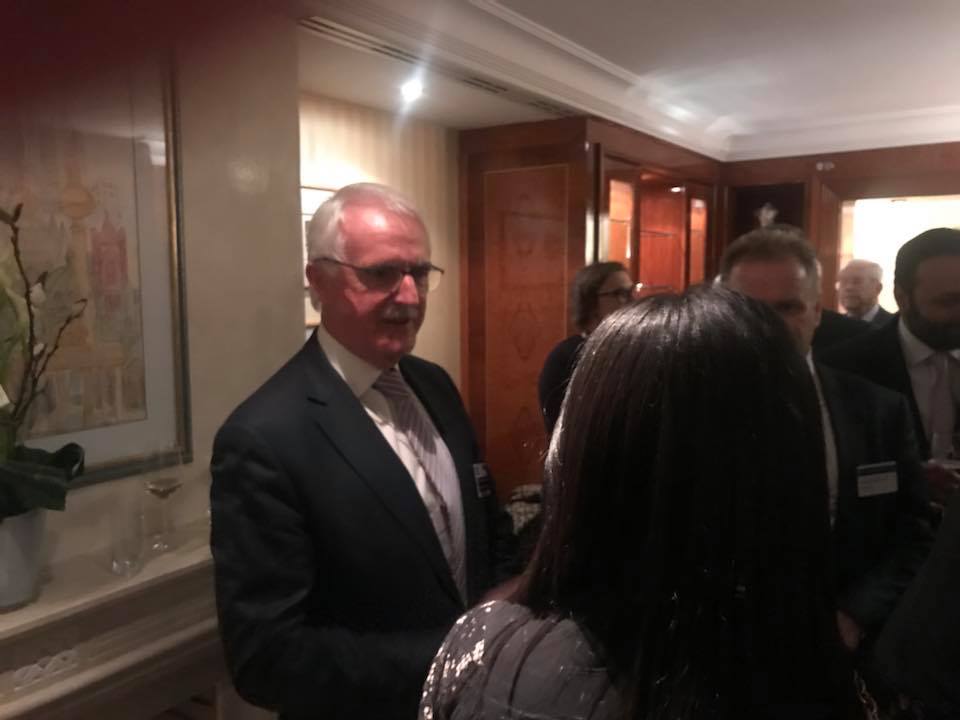
The day before ITB Berlin: IHIF and WTTC in the spotlight
The Intercontinental Hotel in Berlin was in the spotlight yesterday one day before the opening of ITB 2018 in German’s capital Berlin.
Over 80 hotel company, mostly presented by their CEO’s, attended the International Hotel Investment Forum (IHIF 2018) yesterday at the hotel. This represents the highest number of hotel company CEOs to attend the event in its 21-year history.
New topics covered in special focus breakout: F&B, Serviced Apartments, Resorts, Security & Crisis Management, Wellness, Innovative Deal Structures.
Special focus on key regional markets: Germany, Southern Europe and the Mediterranean, Asia, Middle East & Africa.
New Hotel Tech Hub: an area dedicated to teaching the industry about technology, and an opportunity for technology providers to educate the influential IHIF audience about tech products and services.
After this hotel forum, Gerald Lawless, the outgoing Chairman of the World Travel and Tourism Council was the proud host of the WTTC network cocktail and invited members to the 6th floor of the hotel to his presidential suite for a pre-ITB networking cocktail.
He thanked attending delegates for their support. After a successful term, Mr. Lawless will be replaced as Chairman at the upcoming WTTC Summit in Buenos Aires next month. Members were given an opportunity in Berlin for private fellowship and networking.
UNWTO Secretary-General Mr.Zurab Pololikashvili did not attend. He attended and spoke at the ITB Opening event hosted by German Chancellor Angela Merkel.
He spoke at the event and said:
Chancellor Merkel,
Governing Mayor Müller,
Dr. Frenzel,
Dr. Goeke,
Distinguished guests,
Ladies and gentlemen,
Guten Abend.
It is an honour to be with you today.
I wish to thank ITB for its continuous contribution to the development of the tourism sector.
Ladies and gentlemen,
We gather at a time when a record number of tourists are travelling around the world.
International tourist arrivals grew by 7% in 2017, to reach 1.3 billion. This is an all-time record.
Today, 10% of the world’s GDP, 10% of the world’s jobs, and 7% of the world’s total exports come from tourism.
These are naturally very good news for our economies and our societies.
Yet, besides consolidating the growth of our sector, we need to grow better.
We need to turn these big figures into benefits to all people and all communities, leaving no one behind.
We need to decouple growth from resource use. Place Climate Change at the heart of our agenda.
We need to use the power of technology to make tourism smarter, more competitive and more responsible.
We need to make tourism a leading sector in the road to 2030 and the achievement of our common goals – the 17 Sustainable Development Goals.
Ladies and gentlemen,
I took office only two months ago.
It is with a sense of pride and humility that I assume my post as Secretary-General of the United Nations World Tourism Organization for the period 2018-2021.
Tourism’s sustained growth brings immense opportunities for economic welfare and development.
Yet, it also brings in many challenges.
Adapting our sector to the challenges of safety and security, to constant market changes, to digitalization and the limits of our natural resources should be priorities in our common action.
In this vein, I propose that we as a sector stand together to address the following priorities:
1. Education and Job creation
2. Innovation and technology
3. Safety and Security; and
4. Sustainability and Climate Change
To do so we need to:
1. Embrace a digital tourism sector
2. Adapt to new business models
3. Better manage tourism growth
Someone said there is no “overtourism, only under management”
4. Invest in education and skills development
Dear Friends
Ladies and gentlemen,
If we are to address these issues we have to strengthen public/private cooperation as well as public/public coordination.
I wish to promote what I would call a tourism alliance:
• between ministries,
• local administrations,
• private sector,
• technology partners,
• and so many others on the wide-reaching tourism value chain.
UNWTO is ready to support and work with you to make this happen.
Together we can translate tourism growth into more investment, more jobs and better livelihoods.
Together we can make tourism a sector that protects our environment, our cultures and our people.
As Chancellor Merkel said addressing the tourism industry leaders last year, “you are all development helpers”.
We count on your support and partnership and look forward to working together for a more competitive and responsible tourism sector.
Thank you.
Anita Mendiratta brought the Hon. Rania Al-Mashat , the first female minister of tourism from Egypt to the WTTC presidential suite event. The minister posed for a photo opportunity with the outgoing WTTC chairman but did not address the audience and also leaving for the ITB opening event.
Mr. Lawless the former Group Chief Executive Officer of Jumeirah Group and now Head of Tourism and Hospitality at Dubai Holding, is a leading figure in the world of tourism and hospitality.
In his 18 years as CEO of Jumeirah Group, he spearheaded the growth of the hotel chain to one of the best-known luxury hospitality brands in the world, expanding the company’s portfolio to 22 hotels in 11 destinations and establishing Burj Al Arab Jumeirah as the most luxurious hotel in the world. Gerald has been a Member of the World Travel & Tourism Council since 2005, sitting on the Executive Committee since 2008, and as Vice Chairman since 2012.

Asia Pacific Visitor Forecasts 2018-2022
Hong Kong SAR the strongest destination in both average percentage growth and additional arrivals received in 2022
BANGKOK, March 1, 2018 – Hong Kong SAR will lead Asia Pacific destinations in terms of growth over the next five years, according to the just released Asia Pacific Visitor Forecasts 2018-2022 Full Report. Following on from the earlier release of the Executive Summary Report, the Full Report delves deeper into origin-destination pairs for 40 Asia Pacific destinations, as well as tourism receipts and income and price elasticities, where data permit.
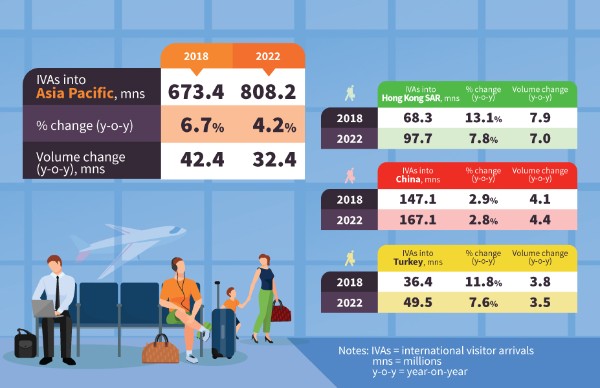
ANNUAL FOREIGN VISITOR GROWTH – 2017 TO 2018
The Asia Pacific destinations covered in this report are forecast to receive an aggregate inbound count of more than 673 million international visitor arrivals in 2018, well in excess of 42 million more than the volume received in 2017. Hong Kong SAR, China and Turkey lead the way with annual increases of 7.9 million, 4.1 million and 3.8 million foreign arrivals respectively.
Destinations in the Americas register highly as well, with the USA and Mexico in particular, expected to show annual increases in inbound foreign arrivals of 3.6 million and 2.6 million respectively.
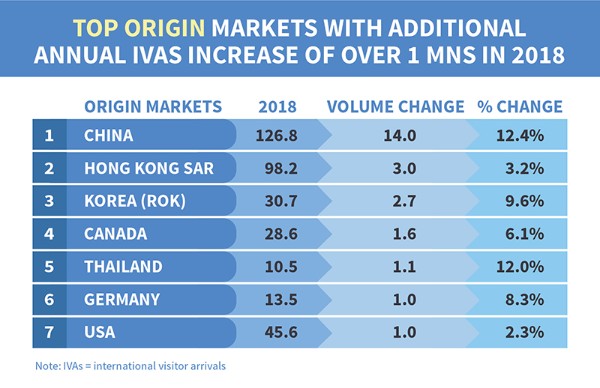
The major international visitor-generating markets will be China, Hong Kong SAR and Korea (ROK) with those three origin markets producing a collective increase of close to 20 million additional IVAs into Asia Pacific between 2017 and 2018. In the Americas, Canada and the USA will generate an additional 2.7 million arrivals. In total, seven origin markets will add volume increases of more than one million foreign arrivals each, from Asia (four origin markets), the Americas (two origin markets) and Europe (one origin market).
Across the arrivals-generating regions, it is expected that Asia will account for 68% of the additional volume received by Asia Pacific destinations between 2017 and 2018; Europe will produce close to 13% and the Americas a little under 11%.
East Europe is expected to produce some solid gains over this period as well, especially out of the Russian Federation and Poland with each of these origin markets producing well over 600,000 additional arrivals each, between 2017 and 2018. Out of the Pacific, Australia will also be a solid producer of foreign arrivals into Asia Pacific, adding more than 780,000 additional arrivals over this period.
PERIOD FOREIGN VISITOR GROWTH – 2017 TO 2022
By 2022, it is expected that China will consolidate its position as the number one destination in Asia Pacific, capturing one-fifth of the total volume of foreign arrivals into the region in that year. Hong Kong SAR and the USA follow in terms of the absolute volume of foreign arrivals in that year, however, China has a lead of more than 64 million over Hong Kong SAR, its closest contender.
Mexico and Turkey make up the top five inbound ranking by absolute volume in 2022 and together, these top five destinations account for well over half (55.5%) of all the foreign visitor arrivals into Asia Pacific in that year.
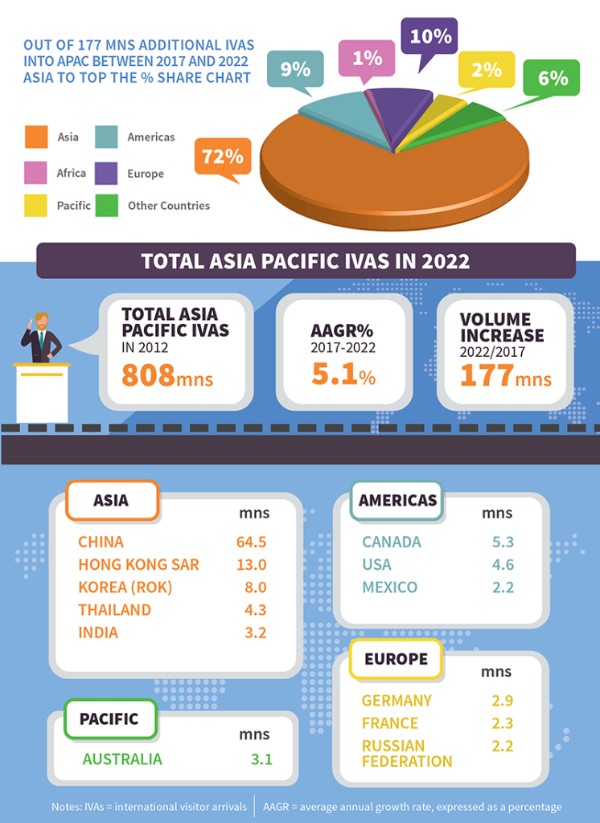
Of the 177 million additional foreign arrivals into Asia Pacific generated between 2017 and 2022, 72% will come from Asian origin markets, 10% from European markets and a little over nine percent will come from origin markets in the Americas.
The strongest Asian market generators of additional visitor arrivals between 2017 and 2022 will be led by China and Hong Kong SAR with respective increases of 64.5 million and 13 million. These will be supported by Korea (ROK), Thailand and India with incremental increases of eight million, 4.3 million and 3.2 million respectively.
Out of Europe, it is expected that the strongest incremental gains in volume of arrivals between 2017 and 2022 will come from Germany, France and the Russian Federation, with increases of 2.9 million, 2.3 million and 2.2 million respectively. Poland (1.9 million additional arrivals) and the United Kingdom (1.5 million additional arrivals) will make up the top five origin markets ranking by incremental increase in the volume of arrivals over that period.
From the Americas, the big three of Canada, the USA and Mexico will generate the most additional volume of arrivals (5.3 million, 4.6 million and 2.2 million) with Argentina and Brazil closing out that top five list with gains of 1.3 million and 0.8 million respectively.
The Pacific also fields a strong supplier of additional foreign arrivals, with Australia producing a period increase of more than 3.1 million, to place it within the top ten list of the strongest generators of incremental volume between 2017 and 2022.
RECEIPTS GROWTH 2017 TO 2018, AND 2017 TO 2022
The tourism-related revenue that these foreign arrivals generate is another useful metric. For the 25 destinations in this report where such data are available, it appears that total receipts from international tourism will increase from US$710 billion in 2017 to more than US$755 billion in 2018 and continue to grow to 2022 when tourism expenditure is expected to reach more than US$955 billion.
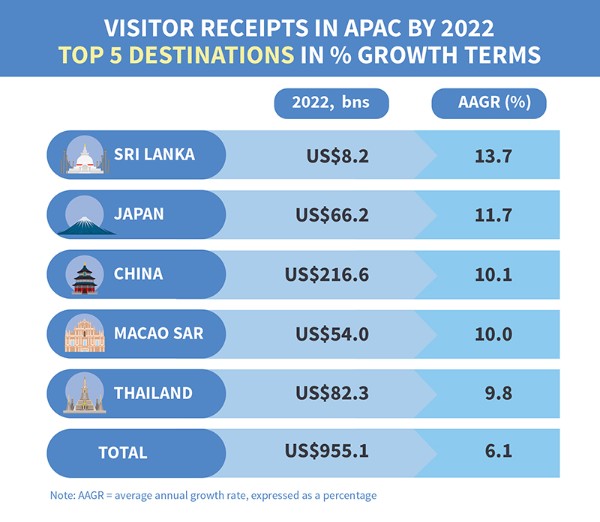
From among these 25 destinations the Americas held a collective 36.1% share of tourism receipts in 2017. That relative performance however, is expected to reduce to 34.7% in 2018 and then fall away to just over 29.1% by 2022 even as receipts will increase by an annual average of 1.7% between 2017 and 2022.
Asia on the other hand, is expected to see its receipts from tourism increase from US$409 billion in 2017 to US$447 billion in 2018, and to almost US$625 billion by 2022. This moves the relative share position of Asia in terms of receipts from international tourism among this group of destinations, from 57.6% in 2017 to 59.2% in 2017 and 65.4% by 2022. The Asian AAGR for tourism receipts between 2017 and 2022 is expected to be around 8.8% with Northeast and South Asia showing even stronger average growth with AAGRS of 9.6% and 9.3% respectively.
This Asian growth will be at the expense of not just the Americas, but also the Pacific region where the relative share position will decline from 6.3% in 2017 to 5.5% in 2022, even while tourism receipts grow at an average of 3.2% per annum over that period.
Said Dr. Mario Hardy, CEO of PATA “The growth momentum of Asia Pacific as both a receiver and a generator of international visitors – not just into Asia Pacific but globally – and the receipts that they generate, is set to continue to at least 2022”.
Dr. Hardy added, “As is always the case, growth in international arrivals across Asia Pacific is often unequal, with subtle changes and shifts occurring as travellers discover new destinations and increasingly turn away from those that do not offer the experiences and memories that they seek and demand or that in themselves are, for whatever reason, seen as unstable and unsafe”.
“It must be recognised that gains in international tourism into destinations and locations, do not always occur by the simple diffusion of generally increasing traveller volumes. Success in this regard requires continuous effort and adaptation in order to deliver the superior service that itself regularly drives the positive experiences as demanded and increasingly expected by a constantly changing traveller profile,” he continued.
“These PATA Asia Pacific Visitor Forecasts for the period 2018 to 2022 can deliver quantifiable insights on how these changes and shifts are expected to play out over the next five years, and do so across a number of metrics. As such they offer a substantive background to anyone making resource allocation decisions in the Asia Pacific tourism sector and should feature in any such decisions,” he concluded.
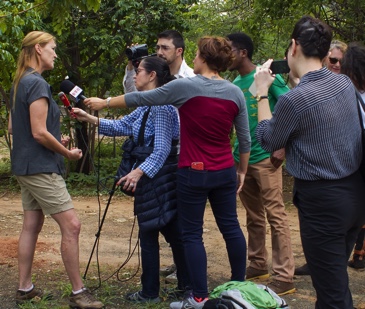
UNWTO/Chimelong Initiative on Wildlife and Tourism launches Media Award
“To engage the media and to recognize the work of journalists in the coverage of wildlife and sustainable tourism.” This is the ultimate goal of the Media Award announced by the World Tourism Organization (UNWTO) on the occasion of Wildlife Day celebrated on 3 March. The UNWTO/Chimelong Initiative aims to promote the value of tourism for wildlife conservation and also includes training to tourism administrations and to media on the theme.
The UNWTO/Chimelong Media Award seeks to recognize the most committed and original purveyors of news and stories related to wildlife conservation and tourism.
“The engagement of media is as important as that of governments and private sector to address the role of tourism as a driver to foster wildlife conservation. Much of our activities in this area are focused in Africa and Asia. The African continent for example is a unique case with regard to wildlife and tourism. Supporting the role of tourism in wildlife conservation is critical for socio-economic development and the achievement of the SDGs and the Agenda 2030 in Africa” said UNWTO Secretary General, Zurab Pololikashvili.
The UNWTO/Chimelong Initiative is being implemented between 2017 and 2019 and aims at engaging key stakeholders like the media and tourism administrations in fostering sustainable tourism as a means to protect wildlife. Seven African countries (Republic of Guinee, Niger, Republic of Congo, Botswana, Benin, Gabon and Democratic Republic of Congo) hosted in 2017 activities of the UNWTO/Chimelong Initiative. Over 100 tourism officers and 50 media professionals have enhanced their capacities and understanding on wildlife through these activities.
A jury of international experts will chose the best piece promoting wildlife and tourism
The Jury of the Media Award is integrated by representatives from UNWTO, the Convention on International Trade in Endangered Species of Wild Fauna and Flora (CITES), UN Environment and Lonely Planet.
John Scanlon, Secretary General of CITES commented “we welcome the initiative of UNWTO on occasion of the World Wildlife Day to highlight the role of the media in raising awareness of how well-managed tourism can support wildlife protection. Journalists can inform and educate the general public, and thereby help generate a positive change in how we view wildlife and sustainable tourism, both within governments and with the private sector”. Scanlon invited journalists worldwide to take part in the competition, “join us in advancing the global cause for wildlife by participating in this years’ Media Award on Wildlife and Sustainable Tourism”, he said.
The role of sustainable tourism in fostering wildlife protection is stressed by Tom Hall, Editorial Director of Lonely Planet and member of the Jury of the UNWTO/Chimelong Media Award. “I’m pleased to be a part of the UNWTO/Chimelong Media Award judging process as the protection of wildlife and advocacy of sustainable tourism is vital to the positive future of travel,” he said.
The Media Award welcomes articles, reports and interviews addressing the topic of wildlife and sustainable tourism published between January 2017 and June 2018 in any of the five UNWTO official languages (English, French, Spanish, Russian and Arabic).
The deadline for submissions is 15th July 2018. The awardee will be designated at the Awards Ceremony that will take place in September 2018.
